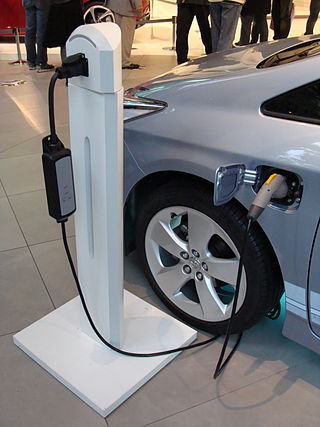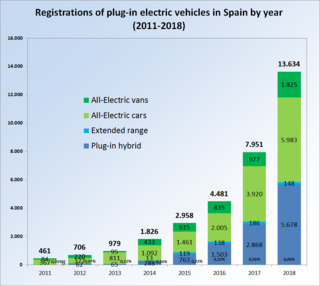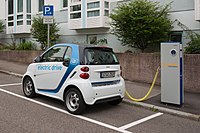Related Research Articles

The Honda Clarity is a nameplate used by Honda on alternative fuel vehicles. It was initially used only on hydrogen fuel-cell electric vehicles such as the 2008 Honda FCX Clarity, but in 2017 the nameplate was expanded to include the battery-electric Honda Clarity Electric and the plug-in hybrid electric Honda Clarity Plug-in Hybrid, in addition to the next generation Honda Clarity Fuel Cell. Clarity production ended in August 2021 with US leases for the fuel cell variant continuing through to 2022.

An electric car or electric vehicle (EV) is a passenger automobile that is propelled by an electric traction motor, using electrical energy as the primary source of propulsion. The term normally refers to a plug-in electric vehicle, typically a battery electric vehicle (BEV), which only uses energy stored in on-board battery packs, but broadly may also include plug-in hybrid electric vehicle (PHEV), range-extended electric vehicle (REEV) and fuel cell electric vehicle (FCEV), which can convert electric power from other fuels via a generator or a fuel cell.

The adoption of plug-in electric vehicles in the United States is supported by the American federal government, and several states and local governments.

As of March 2022, there were about 62,000 electric vehicles in New York, accounting for 0.6% of all vehicles in the state.

Electric car use by country varies worldwide, as the adoption of plug-in electric vehicles is affected by consumer demand, market prices, availability of charging infrastructure, and government policies, such as purchase incentives and long term regulatory signals.

Government incentives for plug-in electric vehicles have been established around the world to support policy-driven adoption of plug-in electric vehicles. These incentives mainly take the form of purchase rebates, tax exemptions and tax credits, and additional perks that range from access to bus lanes to waivers on fees. The amount of the financial incentives may depend on vehicle battery size or all-electric range. Often hybrid electric vehicles are included. Some countries extend the benefits to fuel cell vehicles, and electric vehicle conversions.

ITO Shmeltzer Holdings LTD, widely known as Shlomo Group is a holdings company in Israel, consists car services, automotive, real estate, communications infrastructures, insurance, shipyards services and logistics, and more. The group was founded in 1969 by Shlomo Shmeltzer, the company started out as a car rental, leasing and automotive services company. and today, through subsidiaries, it handles car services, real estate business, communications infrastructures, insurance, shipyard services, logistics and more.

In China, the term new energy vehicle (NEV) is used to designate automobiles that are fully or predominantly powered by electric energy, which include plug-in electric vehicles — battery electric vehicles (BEVs) and plug-in hybrid electric vehicles (PHEVs) — and fuel cell electric vehicles (FCEV). The Chinese Government began implementation of its NEV program in 2009 to foster the development and introduction of new energy vehicles, and electric car buyers are eligible for public subsidies.

The adoption of plug-in electric vehicles in Germany is actively supported by the German Federal Government. Under its National Platform for Electric Mobility, Chancellor Angela Merkel set an initial goal in 2010 to deploy one million electric vehicles on German roads by 2020, which was achieved with a six months delay in July 2021. Initially, the government did not provide subsidies to promote sales of plug-in electric vehicles, however, by the end of 2014 it was recognized that the country was well behind the set sales targets. A purchase bonus scheme was approved in 2016, but premium cars were not eligible to the incentive. In order to meet the climate targets for the transport sector, in 2016 the government set the goal to have from 7 to 10 million plug-in electric cars on the road by 2030, and 1 million charging points deployed by 2030.

The stock of plug-in electric vehicles in California is the largest in the United States, and as of December 2023, cumulative plug-in car registrations in the state since 2010 totaled 1.77 million units. Between November 2016 and until 2020, China was the only country market that exceeded California in terms of cumulative plug-in electric car sales.

As of November 2021, there were about 41,000 electric vehicles in Maryland.
As of April 2022, there were about 6,000 electric vehicles in Maine. As of 2021, 2.4% of new vehicles sold in the state were electric.
As of 2022, there were about 80,000 electric vehicles in British Columbia. As of September 2022, 17.5% of all new vehicles sold in the province were electric.
As of October 2021, there were about 67,000 electric vehicles in Ontario. As of 2021, about 3% of new vehicle registrations in Ontario were electric.
As of March 2022, there were about 76,000 fully electric vehicles and 57,000 plug-in hybrid vehicles in Quebec. As of 2021, about 6.8% of new vehicle registrations in Quebec were electric.
As of September 2021, there were 10 battery electric vehicles and 12 plug-in hybrid vehicles registered in the Northwest Territories.
As of September 2022, there were 97,121 battery electric vehicles and 97,071 plug-in hybrid vehicles registered in Denmark, together equivalent to about 7% of all vehicles in the country. As of August 2022, 19.1% of all new cars sold in Denmark were fully electric, and 18.0% were plug-in hybrid.
As of January 2022, there were about 47,000 electric vehicles in the Republic of Ireland. As of 2022, about 13% of new cars registered in the country were fully electric, and 7% were plug-in hybrid.

As of October 2022, there were 200,000 electric vehicles in Spain. As of September 2022, 6.8% of new cars registered in Spain were battery electric, and 7.4% were plug-in hybrid. Spain has a target for five million EVs in the country by 2030.

Adi Gigi is an Israeli businesswoman and entrepreneur. She served as the inaugural director and general manager of Tesla in Israel between 2017 and 2022. In this role, Gigi led the efforts to transition Israel's auto industry to electric vehicles. In 2003 she became the first woman to graduate from the Israeli Naval Academy, as an electronics officer. She then went on to serve six years in the Israeli Navy, where she specialized in energy security. Following the discovery of the Tamar gas field off the shore of Israel in 20__, Gigi became a founding member of the natural gas production platform. This assisted the transition of the Israeli electricity sector from coal to natural gas, achieving Israel's energy-independence for the first time since its establishment. She was the first woman to build and lead an auto company in Israel. In 2021 Gigi was recognized by Israel's Globes Magazine as well as Calcalist Magazine as one of Israel's 100 most influential people.
References
- ↑ Motor Vehicles in Israel in 2023, Israel Central Bureau of Statistics, 4.2024 (in Hebrew)
- ↑ Lichter, Eyal (1 June 2023). "Number of electric cars in Israel from 2015 to 2022". Statista. Retrieved 31 October 2023.
- ↑ Shmil, Daniel (10 December 2023). "שוק הרכב החשמלי מסכם שנה מוצלחת, אבל התנופה עלולה להיבלם בעתיד". themarker.com (in Hebrew). Retrieved 19 December 2023.
- ↑ Hadar, Tomer (22 October 2022). "חשבתם שיקר לקנות מכונית חדשה ב-2022? תראו מה מחכה לכם ב-2023". calcalist.co.il (in Hebrew). Retrieved 12 November 2022.
- ↑ "היברידי, חשמלי או בנזין – איזה רכב כדאי לקנות ב-2022?". megafon-news.co.il (in Hebrew). 29 March 2022. Retrieved 12 November 2022.
- ↑ "משרד האנרגיה יסבסד הקמת עמדות טעינה ציבוריות נוספות". ynet.co.il (in Hebrew). 30 July 2022. Retrieved 12 November 2022.
- ↑ "שוקלים לרכוש רכב חשמלי? שאלות ותשובות למהססים". ynet.co.il (in Hebrew). 27 September 2022. Retrieved 12 November 2022.
- ↑ "יש מכוניות חשמליות, אין טעינה". calcalist.co.il (in Hebrew). 17 January 2022. Retrieved 12 November 2022.

